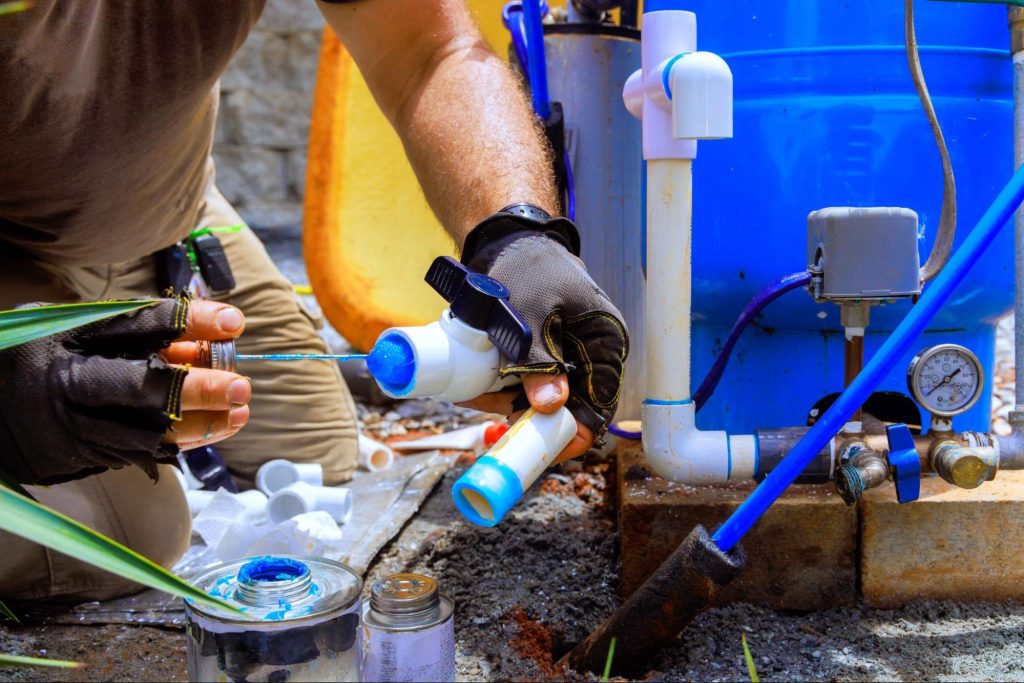Hard water is a common issue in households nationwide, affecting everything from plumbing systems to daily comfort. Over time, mineral buildup can damage fixtures, reduce appliance efficiency, and increase energy costs. A water softener prevents these issues, but, like any system, it requires consistent care to remain effective. Many homeowners underestimate how quickly performance can decline without proper maintenance. Knowing when to schedule service isn’t just helpful; it also protects your investment and ensures reliable water quality.
What is a Water Softener Service?
A water softener service is a professional check-up that cleans, inspects, and tests the system to ensure it functions properly and removes hard minerals effectively. This process reduces the risk of mineral buildup, poor water quality, and costly repairs. Many homeowners miss the early warning signs, only noticing issues once hard water problems have returned. At that point, damage may affect pipes, appliances, or the system.
Understanding the Basics
During service, a technician checks every key part of the softener to ensure it’s functioning correctly. It includes inspecting the brine tank, confirming salt levels, testing regeneration cycles, and cleaning or replacing blocked injectors. They also look at bypass valves and overall system settings. These steps help prevent clogs, improve water flow, and reduce wear on internal parts. With consistent service, the system operates more quietly, uses less salt, and treats water more reliably.
What Routine Service Helps You Avoid
Without regular maintenance, minerals such as calcium and magnesium accumulate within the system. This buildup makes it more difficult for the softener to treat the water properly. Clothes may feel rough, and appliances can develop scale or residue. You might also see cloudy spots on glassware or fixtures. These are clear signs that the system is underperforming. Ongoing neglect often leads to long-term damage and higher repair costs.
How Often to Schedule Water Softener Service
Most systems need professional attention once every 12 to 18 months. It keeps them functioning reliably and prevents expensive repairs. However, exact timing depends on system type, water quality, and usage levels. So, while once a year works for many, others may need more frequent service.
Follow the Manufacturer Guidelines for Timing
Manufacturers usually provide a clear service schedule in the product manual. Most recommend an annual inspection and cleaning by a professional water treatment service. High-efficiency or smart models may stretch to 18 months between visits. Older systems often need more frequent checks to stay effective. Sticking to the recommended timeline helps protect your warranty and keeps the softener running properly..
Adjust Frequency Based on Household Factors
The number of people in your home impacts how often the system cycles. More users mean more water usage and greater strain on the softener. Local water hardness levels also play a role, as harder water demands more frequent regeneration. The age and type of your system also affect maintenance intervals. Older or smaller units typically require more frequent service to remain efficient.
Your Salt Type Can Change the Service Timeline
The kind of salt you use affects how well the softener performs over time. Lower-grade salts or rock salt often contain impurities that can cause clogs or bridging. It forces the system to work harder and may shorten the time between service appointments. High-purity salt burns cleaner and reduces buildup in the tank. Choosing the right type can help extend the time between service visits.
Match Service Timing to Daily Water Habits
Your household’s water habits directly impact how often your softener needs attention. Frequent laundry, long showers, or daily dishwasher cycles can increase the system’s workload. This leads to faster resin fatigue and higher salt usage, resulting in shorter service intervals. Low-use households, such as seasonal homes, may experience fewer issues over time. Tailoring your maintenance to your actual water use keeps service timely and efficient.

Signs You Need Water Softener Service
Sometimes, your system speaks up before your calendar does. Subtle changes in water quality or system behavior signal it’s time to act. Ignoring these signs can shorten system life and increase costs. Staying alert helps prevent avoidable damage.
Spots or Cloudy Residues
You may notice soap or shampoo not lathering properly, leaving a buildup in your hair. Dishes may come out of the dishwasher with spots or cloudy residue. Dry skin, itchy scalp, or stiff laundry are often linked to rising hardness levels. These everyday inconveniences indicate that the softener is losing its effectiveness. Scheduling a service call promptly can help restore water quality before issues escalate.
Fluctuating Water Pressure or Unusual Sounds
Water softeners can affect household pressure if they clog or fail mechanically. You might also hear humming, knocking, or clicking from the unit. These sounds indicate a stuck valve, a brine line issue, or sediment buildup in the system. It’s best not to ignore these changes. Having a technician inspect them early can prevent more significant system failures.
Salt Usage Patterns Suddenly Change
If your softener stops using salt or starts using too much, it’s a red flag. Salt bridges, or solid crusts forming in the tank, can interrupt brine production. Conversely, excessive consumption may signal an internal leak or inefficient regeneration cycle. In either case, your softener isn’t working correctly. Routine service helps diagnose and correct these problems early.
Error Codes on Digital Displays
Modern softeners often include display panels with alerts or error codes. Something is off if you see blinking lights, error numbers, or frequent regenerations. These codes indicate sensor failures, valve issues, or incorrect programming. A professional technician can read the code and reset or repair the issue. Leaving it unresolved could damage other parts of the system.
Why Waiting for Signs Can Cost You More
Softener problems often begin quietly, with slight declines in performance. When symptoms such as scale or pressure changes appear, minerals can damage the plumbing. Delaying service leads to higher salt usage, clogged valves, or complete breakdowns. The cost of neglect often outweighs the price of annual maintenance. Scheduling service before symptoms show keeps your system one step ahead of failure.
DIY vs. Professional Water Softener Service
Maintenance can be simple when done regularly. Still, knowing when to call in a technician saves time and prevents mistakes. Striking the right balance between DIY and professional care keeps your system reliable.
What You Can Do Yourself
Basic tasks, such as refilling salt and cleaning the brine tank, can be done at home. You can also look for visible salt bridges or flush the system if needed. Checking the settings and inspecting hoses for wear helps spot early issues. These quick jobs don’t require special tools or expertise. Performing them monthly enhances your system’s long-term reliability.

When to Call the Pros
Professional service goes beyond what most homeowners can handle. Technicians clean internal parts, test for pressure consistency, and reset complex cycles. Some issues, like resin degradation or injector clogs, require trained hands. Annual service also keeps your warranty valid. A technician’s inspection offers peace of mind that your softener is performing at its best.
What Technicians Do That Homeowners Can’t
While homeowners can handle simple maintenance tasks, many require specialized tools or system knowledge. Technicians test resin saturation, recalibrate digital controls, and check pressure differentials —tasks that most users can’t safely perform. They also identify subtle issues, such as brine valve failure or improper backwash cycles. These aren’t always visible but can affect performance over time. That expertise ensures the system runs as efficiently as possible.
How Routine Water Softener Service Extends Lifespan
Well-maintained systems last longer and perform better. Regular service reduces repair costs and protects appliances from mineral damage. It also improves overall efficiency and lowers utility bills.
Improves Efficiency and Lowers Bills
A properly serviced water softener uses less salt and regenerates more efficiently. That means fewer cycles, reduced electricity use, and less waste. Clean systems deliver a steady water flow without clogging or pressure drops. Efficient performance also preserves water heaters and washing machines. Over time, this adds up to substantial savings.
Prevents Premature Replacement
Unchecked systems may suffer from valve failure, resin contamination, or tank corrosion. These issues often lead to complete system replacement. Servicing prevents this by catching wear and tear early. A softener that’s cleaned and tested regularly can last over a decade. That’s a significant return on a relatively small maintenance cost.
Improves Water Quality for Healthier Living
Inconsistent water softening doesn’t affect pipes; it appears in your daily routine. When mineral levels rise, soap doesn’t properly cleanse, leaving residue on your skin and hair. That can lead to dryness, itchiness, or even blocked pores over time. In the kitchen, untreated water may leave streaks or film on surfaces, cutting into overall cleanliness. Regular service ensures the system works as intended, stabilizing water quality. It helps maintain a cleaner, healthier home environment day after day.
Protects Your Plumbing System
Hard water wears down pipes from the inside, leading to scaling, clogs, and higher water pressure. Over time, this can cause leaks or pipe replacements. A well-maintained softener reduces that risk by keeping minerals out of the plumbing system. That means fewer pipe repairs and less money spent on unexpected fixes. It’s another reason to prioritize routine service.
Cost of Routine Water Softener Service
Service pricing can vary by location, system type, and provider. Still, regular upkeep is much cheaper than emergency repairs. Understanding the costs helps you budget more confidently. It also enables you to compare service plans and choose the one that best fits your system’s needs.
What You Might Pay
Service costs vary widely, but most homeowners generally spend between $100 and $300 per visit. This range typically covers routine tasks like testing, cleaning, checking salt levels, and making basic adjustments. However, additional charges may apply if parts such as resin beads or control valves need replacement. Some companies offer service plans with discounted annual rates, which may differ from standard pricing. These figures are general estimates and may not reflect the exact rates of your chosen provider.
The Long-Term Value of Routine Service
Regular water softener service delivers clear financial benefits. It helps prevent costly repairs, lowers utility bills, and extends the life of appliances that rely on treated water. Water heaters and dishwashers perform better and last longer with consistent soft water. Routine maintenance also reduces issues like pipe scaling and excessive detergent use. Over time, these savings easily outweigh the cost of scheduled service.
Schedule Water Softener Service Before Trouble Starts
Waiting for signs of failure costs more than routine care ever will. Quiet systems still require attention, even when everything appears to be in order. If your water softener hasn’t been checked in a year or more, now’s the time to schedule a check. Consistent service protects your home, comfort, and peace of mind, ensuring uninterrupted protection.
Looking for practical solutions and seasonal insights? Visit the Prestige—Plumbing, Heating, and Cooling blog to stay ahead of home system care.

